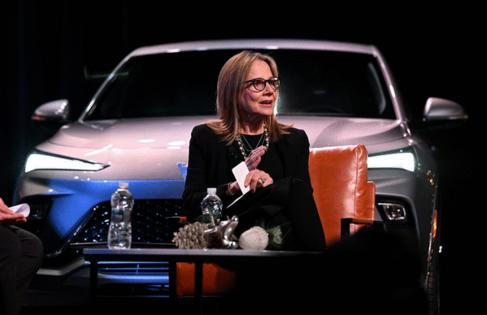Barra: Trump tariff threat would have big impact but is 'part of the negotiation'
Published in Business News
DETROIT — General Motors Co. CEO Mary Barra acknowledged Wednesday that higher tariffs on goods from Mexico and Canada under the incoming Trump administration "could have a very substantial impact" on the automaker.
But she added that President-elect Donald Trump's recent statements calling for 25% tariffs on goods imported from the two countries "is part of the negotiation, to accomplish goals," and that she understands there had been recent productive conversations between him and the leaders of Canada and Mexico.
"We're providing input in the background to what certain things would (do), what the implications would be," she said. "We'll continue to do that. That's our role as new policy is considered."
In Mexico, General Motors Co. makes gas-powered Chevrolet Silverado and GMC Sierra light-duty trucks, the all-electric Chevrolet Equinox and Blazer and the gas-powered Equinox and Blazer, the GMC Terrain and the coming Cadillac Optiq EV, according to AutoForecast Solutions LLC. GM also makes transmissions, engines and parts of the EV powertrain system in Mexico. In Canada, GM produces light and heavy-duty trucks and Chevrolet BrightDrop EVs, as well as engines and transmissions.
Barra made the comments during an Automotive Press Association gathering in Detroit, her first substantial interview following the Nov. 5 election, where she also touched on the impact of Chinese electric vehicles, the automaker's new headquarters in downtown, and GM halting funding for its Cruise robotaxi program this week.
In his first term, she and the company at times drew the ire of Trump — related to producing ventilators during the pandemic, factory closings, and leaving a business advisory panel. On Wednesday, she notably didn't say anything that might put GM in the crosshairs again, and noted that the company and Trump are "goal aligned" on wanting a strong manufacturing base and building up the auto industry in general.
"Any time you have an administrative change, there's policy changes that occur," she said. "We've been working with any every administration for the last several decades, and General Motors will continue to do that. But I'm actually looking forward to working with the president and with the administration, because I think we can grow the importance of the auto industry and manufacturing, and so I think there's a lot that we have in common."
With both President Joe Biden and President-elect Trump, "you're having factual conversations," she said, and views her role as CEO as someone who can help politicians understand "the implications and realities" of policies they might be considering.
Barra also briefly weighed in on Elon Musk, the CEO of rival Tesla Inc. who has become a key adviser to Trump and will spearhead the new Department of Government Efficiency, or DOGE, which aims to cut regulations and government spending.
She acknowledged she does not know what his "complete priorities" might be, and avoided answering a question about whether he would be a good ambassador for the auto industry in the new administration, but said there could be some positive aspects to DOGE.
"If you look at some of the bureaucracy and regulations that are impacting many, many industries, there is ample room to have streamlined processes," Barra said. "I mean, permitting is one example where, right now the permitting process is done very serially. No one's trying to do something that's not right for the environment or not right for the community, but if everything has to be done in series, as opposed to done in parallel, that's when you find you're in a situation where it takes you 10 years to get the permits approved to do something."
Trump has pledged to roll back Biden's Inflation Reduction Act policies that have helped increase EV adoption, including a $7,500 tax credit. And he also has promised to cut back on more stringent federal and state emissions requirements that have spurred automakers to develop more EVs. Barra said all of that was sure to affect EV demand and the profitability of GM's expanding electric lineup.
"IRA, especially the $7,500 tax credit, is driving demand," she said. "Without that, that (demand) will slow."
The Detroit automaker's EV sales increased 60% year-over-year in the third quarter and were up 46% from the second quarter of 2024. GM reported record electric-vehicle deliveries of 32,095, making the automaker the second-best EV seller behind Tesla.
©2024 www.detroitnews.com. Visit at detroitnews.com. Distributed by Tribune Content Agency, LLC.












Comments